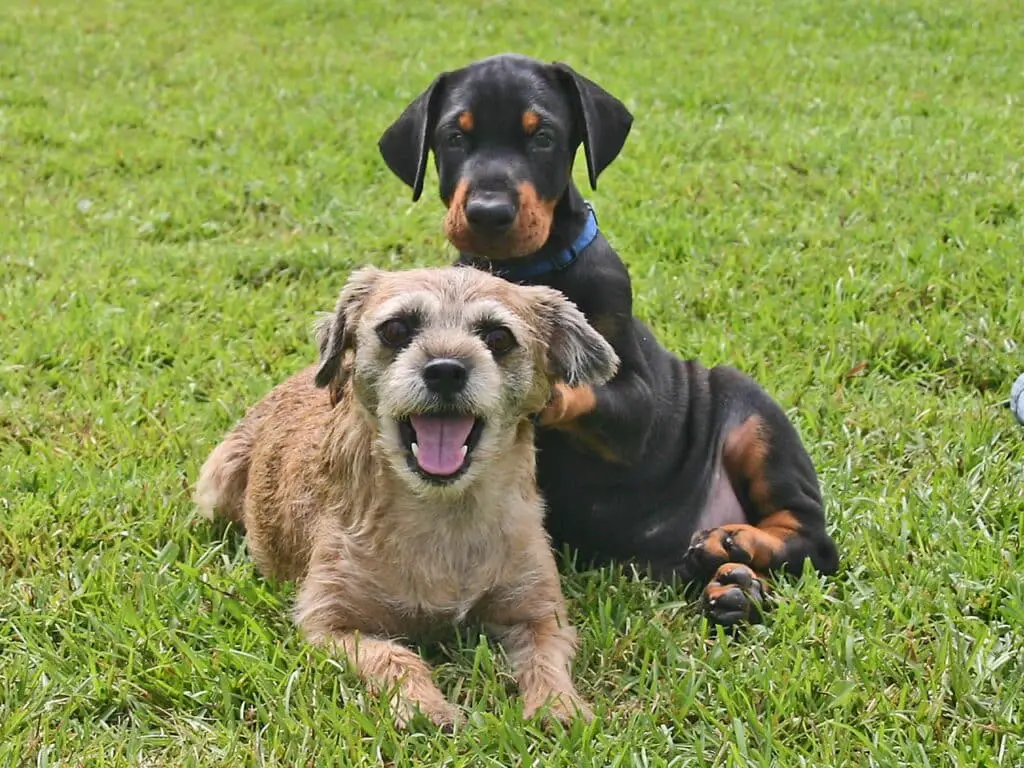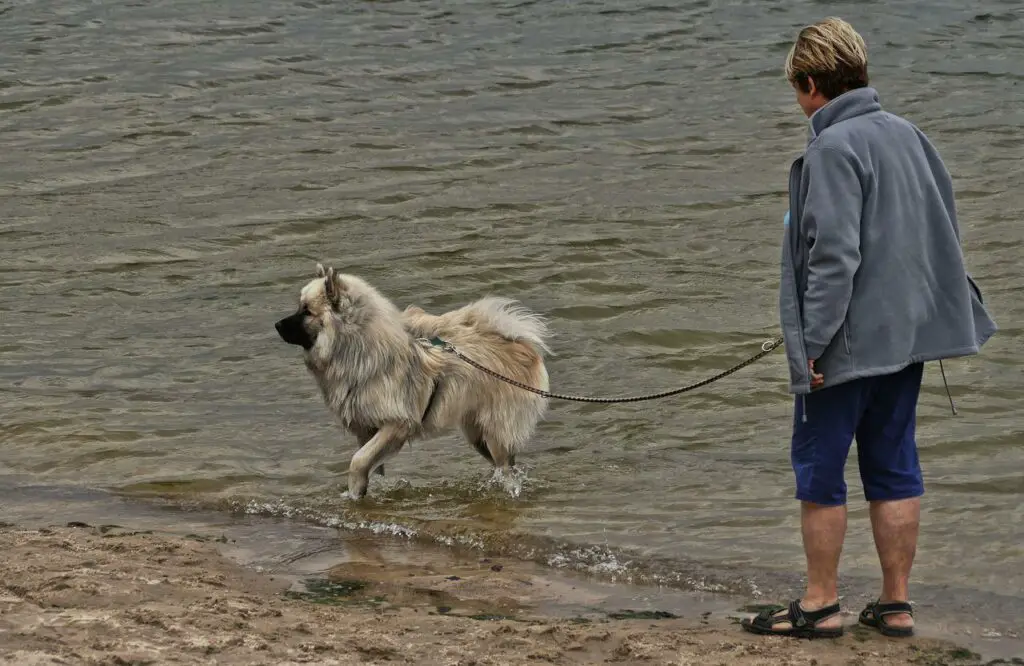After the rains in the evenings, taking your furry friend for a walk can be a nightmare, trying to steer him away from the dirty puddles of water.
All your energetic canine wants to do is jump around in the muddy puddles and drink from them, making you worry about his safety.
So, can dogs drink dirty water?
No, dirty water and puddles can be contaminated with bacteria and parasites that are dangerous to your canine’s health.
Giardia and leptospirosis are some organisms and bacteria that can infect your pup, causing health problems like jaundice, difficulty breathing, and organ failure.
Let’s dig deeper into why your dog should avoid dirty water, what to do if your canine is infected, and measures to keep your pet safe.

Why dirty water is unsafe for dogs
When water forms pools, it likely has contaminants from dirt, litter to animal droppings, and other environmental toxins.
Some gutters, lakes, and streams are likely dirty, contaminated water sources.
These contaminants present major health problems for dogs.
If your canine drinks from puddles, they risk contracting giardiasis, leptospirosis, antifreeze poisoning, blue-green algae, and lungworm infection.
Giardia infection
Giardia is a single-celled protozoan parasite that thrives in cool and moist conditions.
It can survive for months in your canine’s gut.
Giardia infection or giardiasis is transmitted when a dog swallows the parasite in water contaminated with fecal matter.
Some dogs fail to show symptoms of infection even when they have the parasites in their intestines.
For those that show symptoms, signs to look out for are:
- Watery diarrhea (can be bloody and have mucus)
- Vomiting
- Bloating
- Dehydration
- Dry fur
- Loss of appetite
- Weightloss
Severe diarrhea should be of concern, especially if it lasts more than a day.
Visit a veterinarian immediately for a proper diagnosis and treatment.
After a series of medications on dewormers and antibiotics, your canine should get retested to ascertain that it recovered fully.
In severe cases, intravenous treatment and hospitalization may become necessary.
Leptospirosis
Pooled water contaminated with urine from an infected animal such as a rat or another dog is likely to spread infection.
Bacteria found in the infected water cause leptospirosis.
Like Giardia infection, your furry friend may fail to show signs of illness.
Symptoms to keep an eye out for are:
- Diarrhea
- Vomiting
- Fever
- Abdominal pain
- Loss of appetite
- Severe weakness
- Muscle pain
- Stiffness
Visit your vet immediately if you suspect your canine has a bacterial infection.
Younger and less healthy pups are worst affected than older ones.
It takes between 5 to 14 days between exposure and full-blown infection.
Your pet stands a higher chance of recovery and survival if the condition is detected early.
The quick medical intervention also reduces the chances of severe organ damage.
In extreme cases, your furry friend may need dialysis and hydration therapy.
Antifreeze poisoning
Antifreeze is also known as ethylene glycol.
Pools of dirty water and puddles around parked vehicles are likely to have antifreeze which is fatal for dogs as even small doses can cause irreversible liver and kidney damage.
It would help if you took immediate action once antifreeze poisoning is suspected.
The effects occur within the first 30 minutes, and by 72 hours, your dog may die.
Symptoms of antifreeze poisoning, in order of occurrence, are:
- Vomiting
- Lethargy
- excessive urination
- Low body temperature
- Severe thirst
- Dehydration
- Rapid breathing
- Fast heart rate
- Seizures
- Coma
Any delay may cause your dog to suffer from severe kidney failure seen by swollen and painful kidneys, no urine, lethargy, seizures, and coma, which may lead to death.
If you think your dog has ingested antifreeze, induce vomiting and call your vet immediately.
Your vet will test the antifreeze levels in your canine’s blood, and if brought in good time, the medication issued should be effective in the first 12 hours.
Lungworm infection
Puddles may also contain lungworm larvae from snails and slugs.
A dog that drinks from the dirty water containing the larvae is likely to get lungworm disease.
The symptoms depend on the number of parasites in the lungs, age, and immunity status of the dog; puppies are more susceptible to lungworms than adults.
Symptoms are non-specific and can be confused with other chest infections.
They include:
- Coughing
- Sneezing
- Rapid breathing
- Wheezing
- Lethargy
- Respiratory distress
If your canine shows any signs of breathing difficulties, visit a veterinarian.
Your vet will take an x-ray of the chest to check for abnormalities.
Medication will be issued if confirmed, depending on the infection’s severity.
Always include lungworm deworming in your fur buddy’s vaccine program.
Blue-green algae infection
These algae are classified as a bacterium and are common in ponds and puddles, especially during the hot summer.
If your dog drinks from the dirty water, you must visit a veterinarian immediately to increase your pet’s chance of recovery and survival.
Symptoms to look out for include:
- Diarrhea
- Vomiting
- Seizures
- Collapse
- Death

How to keep your dog safe from infection?
Here are a few guidelines to keep your dog safe and healthy.
As difficult as it may seem, keep your dog away from stagnant puddles, pools, streams, and lake water.
Vaccinate your dog regularly.
Carry bottled water for your dog any time you go for a walk and a small drinking bowl, or use the palm of your hand.
Clean and disinfect your surroundings to get rid of parasites and bacteria.
Clean up after your pet by always picking their poop.
Wash your hands after handling your canine or its excrement to avoid spreading bacteria, especially when handling food and drink.
Eliminate the rodents as they carry pests, diseases, and bacteria.
Ensure your sick dog takes all prescribed medication and follow up with the vet.
Safe water to give your dog
Dogs need water and lots of it to avoid dehydration.
Always ensure your canine has fresh drinking water in a clean bowl.
Whether you opt for tap or bottled water, ensure an easily accessible, round-the-clock, and steady water supply.
Dogs need about an ounce of water for each pound they weigh.
Remember to always carry some water for your dog when outdoors.
This is especially so if your dog has diarrhea and vomiting.
The water rehydrates and prevents the loss of more water.
Final thoughts
Dogs have so much fun playing in dirty ponds and pools, but the risk that comes with it isn’t worth it.
Keep your furry friend away from dirty water to avoid harmful bacteria and parasites.
An updated vaccination schedule for your dog is also imperative, be sure to contact your vet for guidance.
- What Dog Breeds Have Pink Skin? - March 24, 2023
- What Are the Most Inspiring Dog Breeding Quotes? - March 20, 2023
- Can Pheromone Spray Help Improve Dog Breeding Results? - March 19, 2023








